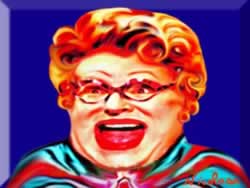Riverfront Times Mar 17, 2004
You’ll Laugh, You’ll Coif
Hairspray is a lean, mean entertaining machine
BY DENNIS BROWN
In the opening scene of the deliriously cyclonic Hairspray, which is currently testing the very foundations of the Fox Theatre, the curtain rises to reveal a corpulent teenager lying in bed. Or is she? After a moment you note that her bed is vertical, not horizontal. The scene has been imaginatively staged as if the audience is looking down from the ceiling, thus creating an optical illusion. As the evening plays out, one realizes that the entire musical is an optical illusion. A show about flabby women doesn’t have an ounce of fat on it. Hairspray is a lean, mean entertaining machine.
Based on the 1988 film written and directed by John Waters, the fairy tale of a plot is set in Baltimore in June 1962, in a perky-slim world measured by Gidget, Metrecal, Debbie Reynolds and segregation. “Is there no pity for a teen who’s trying to fit in?” asks sixteen-year-old butterball Tracy Turnblad, whose only goal is to dance her chubby little heart out on a TV show. By the time all is resolved, the indefatigable Tracy succeeds in integrating that dance show and capturing the heart of its Troy Donahue look-alike. “Isn’t that too cool?” she asks with the innocence of a plump Cinderella. You bet it is. And surprising, too. For despite all the acclaim that has been heaped on Hairspray, including eight Tony Awards last June, you have to see it with your own eyes — you have to be swept along on the tidal wave of its relentless momentum — to fully appreciate its infinite capacity for nonstop fun.
One senses that director Jack O’Brien’s key challenge was to inspire his creative staff to wild extremes without allowing them to overreach into unforgivably bad taste. Words like camp and kitsch affix themselves like carbuncles to Waters’ films. But this production is high-tech glitzy without lapsing into crude garishness; there’s not a pink flamingo in sight.
Jerry Mitchell’s bright, smiling, yet rigorous choreography leaves the viewer exhausted; one can only imagine how it leaves the dancers. The witty script by Mark O’Donnell and that sage veteran Thomas Meehan (Annie, The Producers) delivers solid laughs. Alas, the pulsating music score by Marc Shaiman and Scott Wittman is not great; it’s merely perfect. The tunes sound as if they might have been written for Lesley Gore or the Shirelles, but the orchestrations are straight from the 21st century.
All credit to the producers for the sheer bravado of having cast the two leading roles with inexperienced, yet delightful, stage actors. In her professional debut as Tracy, the sensational Carly Jibson makes the Energizer bunny look like a candidate for the old hare’s home. Jibson is incapable of merely walking across the stage; it’s as if her shoes contain mini-springs. Try to envision Roseanne Barr as a teenager who sings like Brenda Lee, and you’re warming up to Jibson’s pudgy charms.
As Edna Turnblad, Tracy’s endearing blob of a mother, Bruce Vilanch is equally beguiling. When Edna first appears, Vilanch seems to be merely going through the arm-flailing motions of playing a role in drag (and a fat suit, to boot). But as the evening progresses, Bruce and Edna merge in a subtle, winning way. You actually begin to care about Edna’s feelings; where did that come from? It came from Vilanch, the only person onstage imposing enough to play against the show’s driving beat. He takes his time, savors his pauses, and the audience relishes those catch-a-breath pit stops.
But the entire cast excels. As Edna’s husband, former St. Louisan Todd Susman (who might have modeled his stoic portrayal after Professor Irwin Corey) is a perfect foil for the big gals in his family. Sandra Denise is a bedazzling knockout as Tracy’s skinny pal Penny. Her progression from spastic geek to sensuous woman is one of the evening’s joys.
Although Hairspray is so slick that even the playbill paper stock seems to be shinier than usual, the show still finds time to wedge in comments about race relations. But its most serious message concerns the need for a person to be comfortable inside his or her own skin — regardless of how much skin there is. As Edna finally comes to realize in the climactic song, “You can’t stop my happiness/’Cause I like the way I am…If you don’t like the way I look/Well, I just don’t give a damn.”
Like all the show’s characters, black and white alike, Hairspray too wants to belong. It wants to be included in that pantheon of teen-oriented musicals that it seeks to emulate. In Hairspray’s set design one detects a nod to Bye Bye Birdie; in a key plot point, a little something borrowed from Grease. And of course there’s the obligatory John Travolta-inspired dance contest. But pack it all into a bright new bubblegum wrapper, and suddenly this musical seems as fresh as a just-opened can of aerosol spray.



